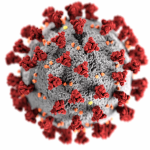How to prevent the next Ebola outbreak
By Laura H. Kahn | July 13, 2014

The Ebola virus has emerged in three West African countries where it had not previously been reported: Guinea, Liberia, and Sierra Leone. In early July, health ministers from 11 countries and representatives from the World Health Organization (WHO) and relevant partner organizations met in an emergency two-day meeting in Accra, Ghana, to strategize on containing the worsening crisis. So far, the outbreak is the largest and deadliest since the disease was first recognized in 1976 in northern Zaire. As of July 8, there had been 888 cases and 539 deaths, with a mortality rate over 60 percent. Previous outbreaks, in Central African countries, typically had mortality rates closer to 90 percent.
This outbreak appears to have been caused by a new strain of the Ebola virus. The initial response was slow, in part because medical professionals were not expecting to see Ebola-infected individuals in a region previously unaffected. In addition, the initial victims did not have the classic symptoms of this hemorrhagic fever, further hindering early identification. Government officials who gave conflicting or inaccurate information did not help speed a proper response, either.
Strong scientific evidence points to the fruit bat as the host species for the Ebola virus. Human activities that increase exposure to fruit bats increase the risk of Ebola outbreaks. The worst activities include widespread deforestation and bushmeat consumption, especially the eating of non-human primates and bats.
After initial transmission of the Ebola virus from an animal to a human, human-to- human contact is most responsible for the disease’s spread. Inadequate health services (including reusing needles and poor implementation of quarantine and isolation practices) should be addressed in containing epidemics such as the one presently worsening in West Africa. Cross-border travel and burial practices that include bathing and touching departed loved ones further the spread of the Ebola virus, which is transmitted by direct contact with bodily fluids and secretions. Denial, panic, and mistrust have further fueled the crisis in densely populated cities.
Environmental destruction and widespread deforestation seem to constitute a common thread in causing the emergence of many of the deadliest viruses known to humanity. Some of the world’s highest rates of deforestation have occurred in West Africa; the Guinea rainforest has shrunk to one-fifth of its former size. Liberia and Sierra Leone are also threatened by massive forest-clearing operations. Deadly viruses such as Ebola and Nipah emerge in human populations after widespread deforestation destroys the habitats of fruit bats to make way for agriculture.
Ebola outbreaks often begin when humans have contact with fruit bats (usually by handling or eating them) or with other Ebola-infected animals, such as apes or chimpanzees, which presumably had contact with bats or their secretions. The consumption of bushmeat—that is, animals taken from the jungle—is extremely dangerous, but cultural practices are very hard to change. For the poor, bushmeat might be their only source of protein.
The Ebola virus was made famous by Richard Preston’s best-selling nonfiction book, The Hot Zone, which raised awareness of its potential as an agent of bioterrorism. The US Centers for Disease Control and Prevention (CDC) lists the Ebola virus as a category A agent and requires research on it to be done in Biosafety level 4 laboratories with full-body protection.
The incubation period (time from exposure to first symptom) for the Ebola virus can last anywhere from two to 21 days. Initial symptoms include fever, headache, sore throat, and muscle pain and weakness. These symptoms are followed by diarrhea, vomiting, a rash, and in some cases internal and external bleeding. People become contagious after they show symptoms; corpses remain highly contagious. There is no treatment or licensed vaccine available for the Ebola virus. Medical care is simply supportive, with intravenous fluids given to keep patients hydrated.
A number of potential Ebola vaccines are being researched. But even if an Ebola vaccine becomes available, that doesn’t guarantee its widespread acceptance and use; the rejection of the measles vaccine by the affluent in developed countries illustrates that even the most effective, safe, and inexpensive vaccines are not always embraced as they should be. The international community can’t rely entirely on vaccines to prevent epidemics, because political factors so often get in the way.
Bushmeat consumption and deforestation are both linked with the need to feed people in Africa. But destroying vast jungle ecosystems to make way for agriculture is an unsustainable practice, and bushmeat eating can be an extraordinarily dangerous practice when certain species are consumed, such as non-human primates and fruit bats. The Ebola virus can be contained, but doing so requires that people be convinced to change behavior that earns them money and provides them food.
The affluent in developed countries deride efforts to promote large-scale livestock production in the developing world because of concerns about the environment, animal welfare, and sanitary conditions. While some of these concerns are justified, the downsides of livestock production pale in comparison to the environmental and public health risks posed by deforestation and consumption of non-human primates and bats.
This is why a One Health approach—an approach that recognizes the connection between human health and animal and environmental health—is so important in Africa. Healthy livestock promote healthy humans. Unfortunately, developing countries have difficulty providing food for their human populations, let alone their livestock. Livestock production accounts for relatively little agricultural output in sub-Saharan Africa. Public health and agriculture experts must work together to improve agriculture and figure out how to meet Africans’ demands for animal proteins in an environmentally sustainable way.
Together, we make the world safer.
The Bulletin elevates expert voices above the noise. But as an independent nonprofit organization, our operations depend on the support of readers like you. Help us continue to deliver quality journalism that holds leaders accountable. Your support of our work at any level is important. In return, we promise our coverage will be understandable, influential, vigilant, solution-oriented, and fair-minded. Together we can make a difference.
Topics: Biosecurity, Columnists, Special Topics














